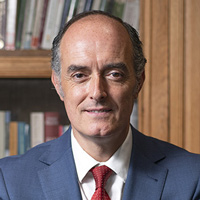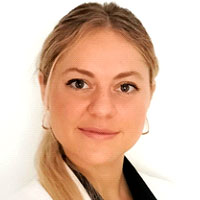Bachelor's Degree in Law
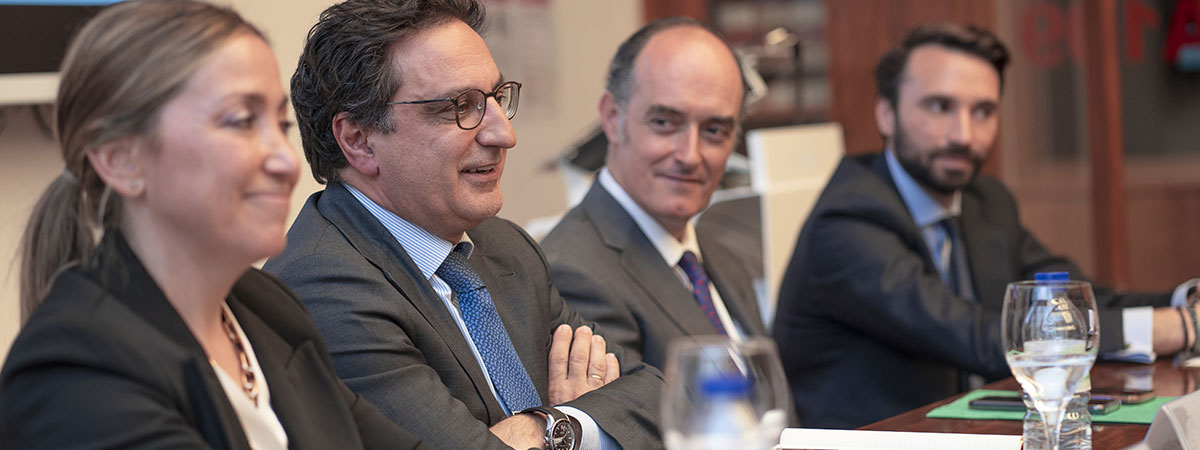
Legal clinic in firms such as Baker McKenzie, Écija and Maio
The Bachelor's Degree in Law from Nebrija University allows the student to acquire specialized training, focused on the practice of law or the business world, through the wide range of electives offered.
The program includes a legal clinic, where students work together with the partners of some of the most prestigious law firms in our country, such as Baker McKenzie, Écija and Maio, in solving cases for non-profit associations and/or corporations. This is a unique opportunity to learn about the professional world and the reality of the sector.

Nebrija University's Law School reinforces its international presence with collaboration agreements with the most prestigious academic networks in the world.
The Bachelor's Degree in Law is a magnificent alternative for those who wish to open up endless professional doors, in which we can highlight its high employability index in various sectors. The Nebrija University graduate has a special training to develop professionally in different areas of law, as a business lawyer, managing their own firm or working for one of the most prestigious law firms in Spain.
In addition, all the Bachelor's Degree courses carry out their professional internships in some of the most prestigious firms in Spain (Garrigues, Écija and Ramón y Cajal) or in public institutions, thanks to the agreement with the General Council of the Judiciary to carry out internships in Courts and Tribunals.
The Bachelor's degree in Law from Nebrija University stands out for the following differential characteristics:
- The teaching method is specially designed so that the student becomes familiar with professional practice through the discussion of real cases, extracted in many occasions from the experience of his/her professors, and the exposition and debate of current legal issues. In this way, the student acquires the analysis, argumentation and decision-making skills essential to successfully carry out his/her professional activity in the future.
- Becoming acquainted with the working world through the compulsory realization of professional internships in prestigious law firms and legal counseling for companies.
- The multidisciplinary design of the new Bachelor's Degree in Law, fully adapted to the EHEA (European Higher Education Area), orients the minds of our students towards the intense knowledge of reality as a whole and not only to purely legal scenarios. The skills and competences of these studies are acquired by the students in a natural way, gradually becoming part of their daily work.
- University extension activities, which include seminars, conferences and visits to institutions and companies (courts, registries, financial centers, public bodies, etc.) that complement education and connect it with reality.
In addition, you have the possibility of combining the Bachelor's Degree in Law with the Bachelor's Degrees in International Relations, Business Creation, Administration and Management, or Security, promoting employability and promoting the figure of a new global Social Sciences professional with an international and transversal character.
Read Less"In a landscape dominated by social and digital transformation, guiding students through their learning journey to nurture versatile professionals capable of delivering innovative, high-quality legal services while upholding a strong commitment to society stands as an exhilarating challenge—one that engages the entire teaching faculty of the Department of Law."

Ana Quintana Director of the Law Department and the Bachelor's Degree in Law for the face-to-face modality
Student mentoring program by active professionals
Curriculum
BOE No. 167, of July 11, 2018
Our curriculum has been prepared in accordance with the new guidelines set by current legislation, having been verified by the National Agency for Quality Assessment and Accreditation.
The student must take 240 credits
First year 60 ECTS
First Semester 30 ECTS- 6 ECTS | Roman Law
- 6 ECTS | Natural law and human rights
- 6 ECTS | Fundamentals of Economics
- 6 ECTS | History of law
- 6 ECTS | Seminar of legal competences and skills I
Second Semester 30 ECTS- 6 ECTS | Civil Law I: Fundamentals of civil law
- 6 ECTS | Administrative Law I
- 6 ECTS | Constitutional Law I
- 6 ECTS | Criminal Law I
- 6 ECTS | Common Law basics

Second year 60 ECTS
First Semester 30 ECTS- 6 ECTS | Constitutional law II
- 6 ECTS | Commercial Law I
- 6 ECTS | Criminal Law II
- 6 ECTS | Introduction to financial and tax law
- 6 ECTS | Seminar on legal competences and skills II
Second Semester 30 ECTS- 6 ECTS | Administrative Law II
- 6 ECTS | Fundamentals of accounting
- 6 ECTS | Civil law II: obligations and contracts
- 6 ECTS | Labor law and Social Security
- 6 ECTS | Privacy and data protection

Third year 60 ECTS
First Semester 30 ECTS- 6 ECTS | Civil Law III: real, mortgage and registry law
- 6 ECTS | Civil procedural law
- 6 ECTS | Elective I
- 6 ECTS | Elective II
- 6 ECTS | Elective III
Second Semester 30 ECTS- 6 ECTS | Civil Law IV: family and successions
- 6 ECTS | Commercial law II
- 6 ECTS | Public international law
- 6 ECTS | Elective IV
- 6 ECTS | Elective V
Fourth year 60 ECTS
First Semester 30 ECTS- 6 ECTS | Criminal Procedural Law
- 6 ECTS | Financial Law II: VAT and corporate tax
- 6 ECTS | Ethics and professional deontology
- 6 ECTS | Community law
- 6 ECTS | Alternative dispute resolution systems
Second Semester 30 ECTS- 6 ECTS | Private international law
- 6 ECTS | Development of the Participative and Solidarity Spirit
- 12 ECTS | Evaluation of the development of skills in the company
- 6 ECTS | Final Research Project
More information on these subjects
Former Curriculum (to extinguish)
The student must take 240 credits
First year 60 ECTS
First Semester 30 ECTS- 6 ECTS | Fundamentals of Economics
- 6 ECTS | Communication theory
- 6 ECTS | General Concepts of Administrative Law and Public Sector Contracting
- 6 ECTS | History of Spanish Law: The Roman and Germanic Influence
- 6 ECTS | The Spanish Constitution and its Law System
Second Semester 30 ECTS- 6 ECTS | Introduction to Law
- 6 ECTS | The Company and its Environment
- 6 ECTS | Fundamentals of Civil Law: Legal Standard, Person and the Legal Relationship
- 6 ECTS | General Concepts of Criminal Law and Theory of Punishment
- 6 ECTS | Competence Development Seminar I
Second year 60 ECTS
First Semester 30 ECTS- 6 ECTS | Contemporary world
- 6 ECTS | History of Political Thought
- 6 ECTS | Law of Obligations and Contracts
- 6 ECTS | Crimes and Offenses in the Spanish Legal System
- 6 ECTS | Legal Statute of the Entrepreneur and the Company and Company Law
Second Semester 30 ECTS- 6 ECTS | Social psychology
- 6 ECTS | Modern languages
- 6 ECTS | Commercial Contracts Law, Banking Law and Stock Exchange Law
- 6 ECTS | Introduction and General Questions of Procedural Law
- 6 ECTS | Competence Development Seminar II
Third year 60 ECTS
First Semester 30 ECTS- 6 ECTS | International Law in the Globalized World
- 6 ECTS | Contentious-Administrative Process, Public Function and Basic Institutions of Administrative Law
- 6 ECTS | Procedural Law and Civil Litigation
- 6 ECTS | Real Rights: its Regulation and Advertising
- 6 ECTS | Competition law
Second Semester 30 ECTS- 6 ECTS | Introduction to European Community Law
- 6 ECTS | Theory of Financial and Tax Law and PIT
- 18 ECTS | Eval. of the Development of Skills in the Company
Fourth year 60 ECTS
First Semester 24 ECTS- 6 ECTS | Procedural Law and Criminal Litigation
- 6 ECTS | Family Law and Succession Law
- 6 ECTS | Labor law and Social Security
- 6 ECTS | Competence Development Seminar III
Second Semester 36 ECTS- 6 ECTS | VAT, Tax on Companies and Tax Procedures
- 6 ECTS | Private international law
- 18 ECTS | Final Research Project
- 6 ECTS | Development of the Participatory and Solidarity Spirit
Professors
| Profesores Professors | Porcentaje de Doctores Percentage of PhD holders |
| 119 | 60% |
 Mónica Assama Rafi
Directora del Grado (modalidad semipresencial)
Director
Mónica Assama Rafi
Directora del Grado (modalidad semipresencial)
Director
 Ana Quintana Jiménez
Directora del Grado (modalidad presencial)
Director
Ana Quintana Jiménez
Directora del Grado (modalidad presencial)
Director
 Gracia Abad Quintal
Profesora
Professor
Gracia Abad Quintal
Profesora
Professor
 Esther Alba Ferré
Profesora
Professor
Esther Alba Ferré
Profesora
Professor
 Álvaro Alarcón Dávalos
Profesor
Professor
Álvaro Alarcón Dávalos
Profesor
Professor
 Ivana Ambrosio Racic
Profesora
Professor
Ivana Ambrosio Racic
Profesora
Professor
 Andrés Jerónimo Arenas Falótico
Profesor
Professor
Andrés Jerónimo Arenas Falótico
Profesor
Professor
 Mª Carmen Arroyo Rodríguez
Profesora
Professor
Mª Carmen Arroyo Rodríguez
Profesora
Professor
 Francisco Avendaño Martínez
Profesor
Professor
Francisco Avendaño Martínez
Profesor
Professor
 Luis Banciella Rodríguez-Miñón
Profesor
Professor
Luis Banciella Rodríguez-Miñón
Profesor
Professor
 José María Bautista Samaniego
Profesor
Professor
José María Bautista Samaniego
Profesor
Professor
 Gema Alejandra Botana García
Profesora
Professor
Gema Alejandra Botana García
Profesora
Professor
 Sonia Boulos
Profesora
Professor
Sonia Boulos
Profesora
Professor
 Santiago Budría Rodríguez
Profesor
Professor
Santiago Budría Rodríguez
Profesor
Professor
 Gregorio María Callejo Hernanz
Profesor
Professor
Gregorio María Callejo Hernanz
Profesor
Professor
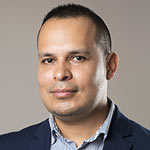 Juan Carlos Campaña Naranjo
Profesor
Professor
Juan Carlos Campaña Naranjo
Profesor
Professor
 Andrea Carrera
Profesor
Professor
Andrea Carrera
Profesor
Professor
 Laura Castillo Navarro
Profesora
Professor
Laura Castillo Navarro
Profesora
Professor
 Susana Beatriz Checa Prieto
Profesora
Professor
Susana Beatriz Checa Prieto
Profesora
Professor
 Víctor Conde Salazar
Profesor
Professor
Víctor Conde Salazar
Profesor
Professor
 María Contín Trillo-Figueroa
Profesora
Professor
María Contín Trillo-Figueroa
Profesora
Professor
 José Luis Cruz Beltrán
Profesor
Professor
José Luis Cruz Beltrán
Profesor
Professor
 Enrique Cubells Angresola
Profesor
Professor
Enrique Cubells Angresola
Profesor
Professor
 Paula Cubí López
Profesora
Professor
Paula Cubí López
Profesora
Professor
 Carlos Cuervo Arango
Profesor
Professor
Carlos Cuervo Arango
Profesor
Professor
 Alfredo Dagnino Guerra
Profesor
Professor
Alfredo Dagnino Guerra
Profesor
Professor
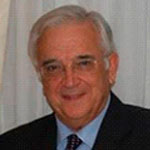 Fernando Davara Rodríguez
Profesor
Professor
Fernando Davara Rodríguez
Profesor
Professor
 Víctor de Gregorio Alcaide
Profesor
Professor
Víctor de Gregorio Alcaide
Profesor
Professor
 Sebastián Del Rey Barba
Profesor
Professor
Sebastián Del Rey Barba
Profesor
Professor
 Fernando Díez Estella
Profesor
Professor
Fernando Díez Estella
Profesor
Professor
 Geoffrey Ditta
Profesor
Professor
Geoffrey Ditta
Profesor
Professor
 David Docal Gil
Profesor
Professor
David Docal Gil
Profesor
Professor
 Carlos Espaliú Berdud
Profesor
Professor
Carlos Espaliú Berdud
Profesor
Professor
 Cristina Fernández Herrero
Profesora
Professor
Cristina Fernández Herrero
Profesora
Professor
 Elena Fernández Ruiz
Profesora
Professor
Elena Fernández Ruiz
Profesora
Professor
 Marlene Fonseca de Freitas
Profesora
Professor
Marlene Fonseca de Freitas
Profesora
Professor
 Luis Armando García Segura
Profesor
Professor
Luis Armando García Segura
Profesor
Professor
 Olivia García de Velasco
Profesora
Professor
Olivia García de Velasco
Profesora
Professor
 Marc Gil Van Beverem
Profesor
Professor
Marc Gil Van Beverem
Profesor
Professor
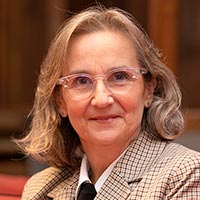 Mónica Goded Salto
Profesora
Professor
Mónica Goded Salto
Profesora
Professor
 Daniel Gómez de Arriba
Profesor
Professor
Daniel Gómez de Arriba
Profesor
Professor
 Almudena Gómiz Macein
Profesora
Professor
Almudena Gómiz Macein
Profesora
Professor
 Mariano González García
Profesor
Professor
Mariano González García
Profesor
Professor
 Montserrat Hernández Martínez
Profesora
Professor
Montserrat Hernández Martínez
Profesora
Professor
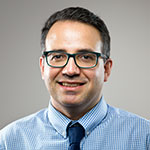 Jorge Hernando Cuñado
Profesor
Professor
Jorge Hernando Cuñado
Profesor
Professor
 Inmaculada Herranz Perlado
Profesora
Professor
Inmaculada Herranz Perlado
Profesora
Professor
 Sara Izquierdo Pérez
Profesora
Professor
Sara Izquierdo Pérez
Profesora
Professor
 Giuseppe Kodjack VII Gangi Guillén
Profesor
Professor
Giuseppe Kodjack VII Gangi Guillén
Profesor
Professor
 Isabel Lacave Sanz
Profesora
Professor
Isabel Lacave Sanz
Profesora
Professor
 Javier Lacleta Michelena
Profesor
Professor
Javier Lacleta Michelena
Profesor
Professor
 Susana Laguna
Profesora
Professor
Susana Laguna
Profesora
Professor
 Gonzalo Lama Muñoz
Profesor
Professor
Gonzalo Lama Muñoz
Profesor
Professor
 Pedro Llorente Cachorro
Profesor
Professor
Pedro Llorente Cachorro
Profesor
Professor
 Begoña del Carmen Lluva Rivera
Profesora
Professor
Begoña del Carmen Lluva Rivera
Profesora
Professor
 María Dolores López Faraldos
Profesora
Professor
María Dolores López Faraldos
Profesora
Professor
 Carlos López Gómez
Profesor
Professor
Carlos López Gómez
Profesor
Professor
 Alejandro López Platero
Profesor
Professor
Alejandro López Platero
Profesor
Professor
 Carmen López-Jacoiste Díaz
Profesora
Professor
Carmen López-Jacoiste Díaz
Profesora
Professor
 Antonio Nicolás Marchal Escalona
Profesor
Professor
Antonio Nicolás Marchal Escalona
Profesor
Professor
 Andreea Marica
Profesora
Professor
Andreea Marica
Profesora
Professor
 Miguel Marinas Depasse
Profesor
Professor
Miguel Marinas Depasse
Profesor
Professor
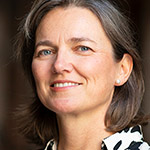 Teresa Martínez Díaz
Profesora
Professor
Teresa Martínez Díaz
Profesora
Professor
 Oscar Martínez Tapia
Profesor
Professor
Oscar Martínez Tapia
Profesor
Professor
 Paula Martínez-Echevarría Ozámiz
Profesora
Professor
Paula Martínez-Echevarría Ozámiz
Profesora
Professor
 José Merino Tapia
Profesor
Professor
José Merino Tapia
Profesor
Professor
 Lidia Moreno Blesa
Profesora
Professor
Lidia Moreno Blesa
Profesora
Professor
 Guillermo Murciano Pérez
Profesor
Professor
Guillermo Murciano Pérez
Profesor
Professor
 Tahina Ojeda Medina
Profesora
Professor
Tahina Ojeda Medina
Profesora
Professor
 Olalde Olalde López
Profesora
Professor
Olalde Olalde López
Profesora
Professor
 Mª Ángeles Palacios García
Profesora
Professor
Mª Ángeles Palacios García
Profesora
Professor
 Ana Isabel Páramo
Profesora
Professor
Ana Isabel Páramo
Profesora
Professor
 Jose Carlos Pedraza
Profesor
Professor
Jose Carlos Pedraza
Profesor
Professor
 María Peñarrubia Bañón
Profesora
Professor
María Peñarrubia Bañón
Profesora
Professor
 María Eugenia Pérez Montero
Profesora
Professor
María Eugenia Pérez Montero
Profesora
Professor
 Mónica Pucci Rey
Profesora
Professor
Mónica Pucci Rey
Profesora
Professor
 José Javier Rainer Granados
Profesor
Professor
José Javier Rainer Granados
Profesor
Professor
 Francisco Ramos González
Profesor
Professor
Francisco Ramos González
Profesor
Professor
 María Luisa Ríos Dávila
Profesora
Professor
María Luisa Ríos Dávila
Profesora
Professor
 Paola Rodas Paredes
Profesora
Professor
Paola Rodas Paredes
Profesora
Professor
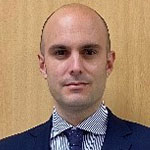 Francisco de Borja Rodríguez García
Profesor
Professor
Francisco de Borja Rodríguez García
Profesor
Professor
 María Victoria Rodríguez Prieto
Profesora
Professor
María Victoria Rodríguez Prieto
Profesora
Professor
 Francisco Romero Caro
Profesor
Professor
Francisco Romero Caro
Profesor
Professor
 Susana Sancristobal Reales
Profesora
Professor
Susana Sancristobal Reales
Profesora
Professor
 María Luisa Sánchez Paredes
Profesora
Professor
María Luisa Sánchez Paredes
Profesora
Professor
 Luis Sánchez-Cervera de los Santos
Profesor
Professor
Luis Sánchez-Cervera de los Santos
Profesor
Professor
 Antonio Sánchez-Collado Obon
Profesor
Professor
Antonio Sánchez-Collado Obon
Profesor
Professor
 Rocío Santamaría
Profesora
Professor
Rocío Santamaría
Profesora
Professor
 Enrique Sanz de Sandoval
Profesor
Professor
Enrique Sanz de Sandoval
Profesor
Professor
 Rafael Satrústegui y Caruncho
Profesor
Professor
Rafael Satrústegui y Caruncho
Profesor
Professor
 Teresa Serrano Sordo
Profesora
Professor
Teresa Serrano Sordo
Profesora
Professor
 Patricia Soriano Machado
Profesora
Professor
Patricia Soriano Machado
Profesora
Professor
 María del Carmen Tejera Gimeno
Profesora
Professor
María del Carmen Tejera Gimeno
Profesora
Professor
 Fernando Tomé Bermejo
Profesor
Professor
Fernando Tomé Bermejo
Profesor
Professor
 Manuel Trenado Torrejón
Profesor
Professor
Manuel Trenado Torrejón
Profesor
Professor
 María Vaillo Rodríguez
Profesora
Professor
María Vaillo Rodríguez
Profesora
Professor
More Academic Information
Official Degree:Bachelor's Degree in Law
Center responsible:School of Law and International Relations
Branch of knowledge: Social and Legal Sciences
Available places: - Classroom attendance: 100
- Blended: 150
Type of Education: Classroom attendance / Blended
Academic year in which it was implemented: 2017
Languages: - This degree in taught in Spanish and English.
- English level required at admission: A2 (MCERL)
- Students who take the subjects Fundamentals of Anglo-Saxon Law/Common law basics and Privacy and data protection/Privacy and data protection in English must certify level B2 (CEFR) or higher in that language.
University Services: [+info]
Competences
Basic competencesIn RD1393/2007, the following basic competencies (CB) are described:
- CB1 That students have demonstrated knowledge and understanding in an area of study that starts from the base of general secondary education, and is usually found at a level that, although supported by advanced textbooks, also includes some aspects that imply insights from the cutting edge of your field of study;
- CB2 That students know how to apply their knowledge to their work or vocation in a professional way and have the skills that are usually demonstrated through the development and defense of arguments and problem solving within their area of study;
- CB3 That students have the ability to gather and interpret relevant data (usually within their area of study) to make judgments that include reflection on relevant issues of a social, scientific or ethical nature;
- CB4 That students can transmit information, ideas, problems and solutions to both a specialized and non-specialized audience;
- CB5 That students have developed those learning skills necessary to undertake further studies with a high degree of autonomy.
- CG1 Manage, organize and properly plan time.
- CG2 Have the ability to communicate orally and in writing in their own language.
- CG3 Have the capacity for analysis and synthesis. Appropriately use the knowledge acquired and the knowledge specific to the legal field.
- CG4 Have the ability to manage information: obtaining, analyzing and retrieving information from various legal sources.
- CG5 Being able to apply knowledge in practice, obtaining results that lead to the resolution of problems in the field of Law.
- CG6 Being able to make decisions.
- CG7 Generate high critical reasoning.
- CG8 Develop interpersonal skills: empathy, tolerance and respect for diversity.
- CG9 Have the ability to generate the exercise of work activity in interdisciplinary teams in the field of Law.
- CG10 Develop the ability to learn and autonomy in learning.
- CG11 Being able to adapt to new situations.
- CG12 Seek excellence and quality in the development of tasks.
- CG13 Efficiently use investigative techniques.
- CE1 Perceiving the legal system as a system.
- CE2 Know the historical, social and cultural context of the exercise of the legal profession.
- CE3 Know the figures and institutions that make up the State and supranational organizations.
- CE4 Analyze and understand complex legal issues.
- CE5 Understanding the Law as a conflict resolution instrument.
- CE6 Know and apply accounting as an information system of the economic-financial situation of the company, as well as its results.
- CE7 Know and apply the basic concepts and instrumental techniques of strategic planning, risk planning and business valuation.
- CE8 Situating the Law and legal relations in a globalized context.
- CE9 Apply the theory to complex practical cases, especially those corresponding to the legal field.
- CE10 Recognize and analyze the legal consequences of the actions of the physical and legal person.
- CE12 Apply ethics in professional practice.
- CE13 Understand the use of oratory and argumentation.
- CE14 Manage legal information and apply it in the required context.
- CE15 Interpret and understand specialized texts in English, applied to the field of Law.
- CE16 Know and understand economic analysis applied to the social sciences at a non-specialized level.
- CE17 Demonstrate that they have developed the necessary skills for professional practice.
- CE18 Identify the elements of a legal problem, proposing alternatives for its solution.
- CE19 Identify and understand the scope of legal norms in social relations.
- CED20 Know and understand the elements, structure, resources, interpretation and application of the legal system and interpret the sources and fundamental legal concepts of each of the different legal systems.
- CED21 Know and know how to apply the priority criteria of the sources to determine the applicable norms in each case, and especially that of conformity with the rules, principles and constitutional values.
- CED22 Interpret legal texts from an interdisciplinary perspective using legal principles and social, ethical and deontological values and principles as analysis tools.
- CED23 Pronounce with a convincing legal argument on a theoretical question related to the various legal matters.
- CED24 Resolve practical cases in accordance with the current positive Law, which implies the prior elaboration of material, the identification of problematic issues, the selection and interpretation of the applicable positive Law data and the argued exposition of the subsumption.
- CED25 Handle with skill and precision the legal language and the terminology of the different branches of Law: Write legal documents in an orderly and understandable manner.
- CED26 Communicate orally and in writing legal ideas, arguments and reasoning using the appropriate registers in each context.
- CED27 Use information and communication technologies to search for and obtain legal information (legislative databases, jurisprudence, bibliography, etc.), as well as work and communication tools.
Blended Study
MetodologyThe Bachelor's Degree in Law follows a methodology based on teaching-learning, centered on the student, which promotes active participation and promotes the development of general and specific skills that demonstrate knowledge, skills and attitudes applicable in a future professional practice. The teaching methodology is based on the use of ICT as a support to collaborative work (forums, chats, meeting by videoconference), the teacher's orientations (agenda, bulletin board, document folder, links) and the submission of assignments (task mailbox and work tools). The Blackboard Virtual Campus will be used for this purpose.
All these techniques mean that the student assumes an active role in his/her academic training. In addition, the work of the professor acquires a guiding dimension of support and guidance, which must be consistent with a transparent and formative evaluation system that faithfully reflects the knowledge and skills acquired.
The training activities are carried out through different teaching strategies: online theoretical classes, online practical cases, online tutorials, and academic activities among which are the reading and analysis of jurisprudence, assignments through virtual resources, search and selection of jurisprudence and legislation; exams and activities for evaluation, individual or small group work.
BLENDED MODALITY
AF1. Master Lecture / Theoretical Fundamentals*
General explanation by the professor and/or their assistants of the theoretical conceptual framework of each subject or area of the Bachelor's Degree, as well as all the conceptual orientations that must be taken into account by the student in order to correctly learn in accordance with the curriculum.
AF2. Practical Class / Practical Case*
General explanation applied to the case in which the professor and/or their assistants focus on the issues being studied, discussed, debated or in conflict, guiding the practical application of the student's theoretical knowledge.
Resolution of cases posed to students after they have first completed them themselves and discussed them in class.
AF10. Remote Tutoring**
Personalized explanation, or in much smaller groups, designed to ensure the acquisition of specific knowledge and competences; resolution of theoretical or practical questions; orientation of the approaches and the monitoring of the procedures used by the students in the subject. The tutoring sessions may be carried out via email, telephone or telepresence. (Skype, illuminate, Collaborate...).
AF11. Individual or group work of distance learning students
Activity to be carried out and submitted by students at the end of each of the courses. Students will also have to do short assignments (individual and/or in groups), as instructed by the professor. They will use the virtual platform and its functionalities to share documents and sources, as well as to work simultaneously on the same assignment.
AF5. Activities through virtual resources
Forums, chats, debates on issues related to the content of the subjects and their practical application.
Self-assessment test and other knowledge tests.
AF6. Access and research on complementary content
Search, selection and hierarchization of information, legislation and doctrine related to the contents of the subjects and/or topics of the Bachelor's Degree.
AF7. Individual study
Individual reflection and analysis of the theoretical and practical contents of the subjects and/or topics of the Bachelor's Degree.
*Educational activities AF1 and AF2 will be in the case of the blended modality in face-to-face lectures, and at the Madrid-Princesa Campus. These sessions will be held two days a month, preferably on Fridays and Saturdays, from 09:00 to 18:00, with breaks for rest and food. In each monthly session the professors will present the theoretical part and propose the debate and discussion of cases of the corresponding subjects. Students must attend class, the attendance described in the subject sheets reflects this.
** AF10 Remote Tutoring will always be synchronous, because it requires the interaction of professor and student.
SE4. Final exam or final project
Students will take a final exam or a final project for each subject. To pass the course, the student must obtain a grade equal to or greater than 5 on a scale of 0-10, with 0 being the minimum grade and 10 the maximum.
SE5. Grading of the internship report carried out by the student
The grading will be based on the following documents:
- Evaluation report by the company after the completion of the internship, written by the company tutor.
- Student’s internship report after completion of said internship.
The company tutor's evaluation report will count as 50% of the final grade and the student's report will be the other 50%.
SE6. Evaluation of the Final Research Project: presentation and oral defense before a tribunal
Each student, individually, must create a report in which all the competences and learning acquired are synthesized. Likewise, the student must present and defend said project before a university tribunal.
SE7. Participation in programmed activities
The professor will keep track of the students' attendance at the synchronous sessions. Likewise, student participation and intervention in the programmed activities will be evaluated.
SE8. Presentation of assignments and projects (Individual practices and teamwork)
Execution of assignments, reports and portfolios, in which students must write and present by videoconference all the information that is collected, reviewed and analyzed.
The final tests or exercises of each subject will always be taken face-to-face.
In the final grade of the subject, the grade of said final test is weighted with the rest of the evaluation elements, with variable weighting percentages for the different elements, depending on the specific contents of the subject or course. The specific weighting percentages in each subject appear in the documentation given to the student at the beginning of the academic year.
All grades will be accessible online, in the student's private area.
Admission
Access requirementsThe Antonio de Nebrija University, in addition to complying with the conditions of admission to bachelor's degree studies in accordance with current legislation, requires candidates to pass its own access tests, both for undergraduate and postgraduate degrees.
Likewise, Nebrija University respects the provisions of Article 13 of RD 1892/2008 and its subsequent modifications regarding passing the university entrance exam:
“1. Access to Spanish universities, both public and private, to take the studies leading to obtaining the various diplomas titles of the official university degree that are valid throughout the national territory, will generally require passing the test, referred to in Article 38 of Organic Law 2/2006, of May 3, on Education, which is regulated in this royal decree, notwithstanding the other cases provided for in Article 3 of this royal decree”.
Students who are in any of the following academic situations can apply for admission into the first year:
- Students from 2nd year of Baccalaureate and Selectividad (Spanish University Entrance Exam) or COU and Selectividad.
- Students who have completed their secondary education studies abroad and have access to university studies in their country (for member countries of the European Union or signatories of the agreement on the European Economic Area or an agreement of recognition of degrees).
- Students who have completed their secondary education studies abroad and have passed the University Entrance Exam for Foreigners (rest of the educational systems).
- Students who have the degrees of Senior Technical Officer corresponding to the teachings of Vocational Training and Artistic Education, or of Senior Sports Technician.
- Students from higher degree training cycles (2nd grade of Vocational Training).
- People over twenty-five years of age, after examination, who do not meet the requirements set forth in section 2 of Article 42 of Organic Law 6/2001, of December 21, and its subsequent amendments.
- People over forty years of age who certify their work or professional experience and do not have the legally required academic diplomas, and people over forty-five years of age, after examination, in accordance with the provisions of article 42.4 of the Organic Law 6/2001, of December 21, and its subsequent modifications.
On the other hand, students who have completed university studies at another Spanish or foreign university and want to continue them at the Antonio de Nebrija University, or who want to start other studies at this University, can also apply for admission.
Students must present the application form for admission to the University along with the required documentation. The submission of the application for admission, together with the form for choosing the date for the admission tests, can be done in person during a visit to the University, or can be sent by post. Likewise, the admission procedure can be started by filling in the online admission form.
The Promotion and Admissions Department confirms to the candidate having received the printed or online application, and will summon him/her to the admission tests. On the day of the test, the candidate must submit, if he/she has not done so in advance, the following documentation:
- Photocopy of the academic record.
- Photocopy of DNI or passport.
- Two passport-size photos.
- Letter of presentation from a professor/tutor from the center of origin, or person with whom they have had academic or professional contact.
At the Antonio de Nebrija University, the admission procedures established by university legislation will be carried out with particular reference to the guiding principles of access to Spanish universities: equality, merit, ability, universal accessibility and adjustment to the criteria of the European Higher Education Area.
The admission process consists of several phases that are described below:
1.- Submit documentation
All candidates who wish to apply for admission must submit the following documentation:
1. Application for admission, completed and signed.
2. Receipt of payment of the registration fees.
3. Photocopy of the DNI (on both sides) or passport.
4. Two passport-size photographs.
5. Although it is not a mandatory document, we recommend a letter of introduction from a teacher/tutor from the center of origin where the student studied, to be attached to the academic documents submitted for the application.
In addition, according to the student's access path to the Bachelor's Degree, the following documentation will be requested:
6. Baccalaureate Academic Record.
7. University Access Exam (PAU).
8. Access credentials to the Spanish University issued by the UNED, for students from the International Baccalaureate or with a European Community Baccalaureate Degree.
9. Specific university access test for international students.
10. For candidates with a completed university degree or with Advanced Vocational Training Programs, academic record of the completed degree.
11.For the students who come through record transfer, academic record of the subjects taken and curricula of each of the subjects passed.
Only candidacies who have submitted the required documentation within the deadlines established by the Admissions Department will be processed. In addition, the student will be asked for all the additional information that is deemed appropriate to know the candidate's suitability for the Bachelor's degree.
For the purposes of pre-admission and admission, the evaluation of the candidate will be made with a scale of 0 to 10 points, taking into account the following criteria and percentages:
1.- Academic record of the student's path of origin: 60%
2.- Psychotechnical multiple-choice test: 10%
This test consists of a competences/skills assessment test related to: skills in intellectual work, attitudes towards cooperation and teamwork, time and resource management. We will try to determine if the candidate has sufficient motivation, training and knowledge, abilities, aptitudes, communication skills, extracurricular activities and future interests necessary to be admitted as a student in the Bachelor's Degree in Law at the Antonio de Nebrija University.
3.- English level test: 10% Students who wish to take the subjects Common Law Basics and Privacy and Data Protection in English must prove to have a B2 level (CEFR) or higher in that language.
In addition to the competences established in the Bachelor's Degree in Law, another has been included that is related to adequate knowledge of the English language, both oral and written. To this end, the Vice-Rector’s Office of Academic Organization and Faculty has established a series of strategies of a diverse nature to facilitate the acquisition of said competence by students, among which are the use of materials in English and the programming of subjects in English.
In order to know the students' real English level, the Department of Modern Languages will carry out a level test at the beginning of the studies. Based on the results of this test, the students will simultaneously take the Bachelor's Degree in Law, depending on each student's placement, and the "Diploma in Modern Languages (English)". The subjects that are part of this Diploma are extracurricular, but certification of C1 level is guaranteed for graduates.
The English level test is a written exam with multiple-choice questions on oral and written comprehension and use of the language. It lasts 60 minutes and the student must demonstrate to have at least knowledge of the English language at an A2 level (CEFR) to take the Bachelor's Degree in Law in Spanish, and a B2 level (CEFRL) or higher to take the Bachelor's Degree in Law with the option of subjects in English: Common Law Basics and Privacy and data protection (CEFR). The tests are taken in person and are carried out in computer rooms on each campus.
4.- Specific test of knowledge about the Bachelor's Degree in Law. It is a multiple-choice test, and consists mainly of specific contents of some of the main areas of general knowledge that will be taken in the degree chosen by the candidate, in addition to other elements common to all degrees. This test will be 20% of the total.
5.- Personal interview: a strategy to know the characteristics of the applicants, carried out by the psychopedagogical orientation department, as a diagnosis of all the candidates, we will apply a personality test that explores the emotional, intellectual, social and norms and values areas of each candidate of the Bachelor's Degree in Law at the Antonio de Nebrija University.
In the event that an applicant presents any clinical indicator, an in-depth interview will be carried out with the psychologists of the Department of Educational Psychology, and if necessary, will be sent for clinical evaluation by the specialist professors in Psychiatry or/and Clinical Psychology.
All tests and student records will be assessed and evaluated by the Bachelor's Degree Admissions Commission, taking into account the criteria reflected in the "PGA_11 Procedure for the Operation of the Bachelor's Degree Admissions Commission", which are part of the Internal Regulations that regulate the access of the candidates to the University.
Employability
Career Opportunities
There are several future career opportunities, from practicing the profession of lawyer both in Spain and abroad, always after fulfilling the other requirements that the general regulations impose, such as consultancy for companies, the integration of large professional firms and consultants, or public service through the numerous pubic examinations, for which the degree in law provides training, are all options that our students can consider.
The Bachelor's Degree in Law of Nebrija University has some of the most relevant companies and institutions in the sector as partners of the program, endorsing the quality of the Degree and facilitating the students to carry out their professional internships. UNICEF, Pwc, Écija, Ramón y Cajal and Santander are some of these companies.
Some of the professions for graduates are:
You will be able to integrate into different departments of the company, such as:
Employability recognized in the Rankings
The commitment of Nebrija University to the academic requirement, training in leading companies and institutions, innovation in multidisciplinary programs and international projection, places the University in the top positions of the most important rankings.
The International Ranking QS Stars awards Nebrija University the maximum score in the quality and satisfaction of students in teaching, employability of the graduates and the internationalization of the institution.
The national rankings also recognize Nebrija University as the first Spanish university in teaching and second in employability, highlighting its performance in research, knowledge transfer and internationalization.
The Bologna Declaration formalized the principles on which the European Higher Education Area should be based: quality, mobility, diversity, competitiveness and employment growth.
From this, Nebrija stands as an academic model of reference, educating students with excellent individual behavior, interaction with their environment and motivated by and for constant and continuous training. The Nebrija Institute of Professional Skills works every day to achieve the differentiation of our students through the development of attitudes and skills.
The main objective is for students to achieve the best of themselves through the development and empowerment of their personal skills and resources through personal self-knowledge.
In addition, some of the professional skills that are worked on within the three seminars are those related to interpersonal skills and active communication skills and negotiation, indispensable for our students to know how to transmit ideas, to argue them, to provide information and opinions in an adequate, clear and convincing way.
Within what will be their work performance, other aspects such as teamwork, conflict resolution and project management ability will be worked on.
In the third block, skills worked on are those aimed at increasing the student's employability. They will work with tools and techniques for job searching, and perform tasks that achieve in the student a greater use of their personal skills.
For all this we have currently active experts in selection of people, professionals dedicated to personal and professional training and professionals dedicated to the world of communication and the arts.
In this way, and in a complementary way to his/her specific training, we help the student create a differentiating pattern in the social and business environment in which he/she will be immersed when he/she finishes his/her studies.
International
After studying the curriculum map of Nebrija University's Bachelor's degrees, the Secretariat of Higher Education, Science, Technology and Innovation of Ecuador (SENESCYT) recognizes this Bachelor's degree through document number SENESCYT-SGES-SFA-2019-0722-O
The International Mobility Office of Nebrija University makes a constant effort to monitor the agreements with the most prestigious universities.
Thus, our law students (if they wish) can carry out part of their studies abroad, either taking advantage of the Erasmus program, or visiting for a semester or an academic year any of the universities with which the University has a bilateral agreement.
Socrates Erasmus Agreement
NOTE :The host universities, offered by degree, may vary according to the International Mobility Program. For more up-to-date information, students can consult the online information in the International Mobility Program.
Several universities have special academic or language requirements. For more information, consult the Department of International Programs.
The information published here is for guidance only and may be subject to modification.
University Life in Law
Visit all the Activities of the School of Law and International Relations
Students from the Law Department can take part in the Nebrija Legal Clinic
The purpose of this initiative is to provide top-level legal advice and practice to non-profit organizations, covering real legal needs, of social interest and in a totally voluntary and altruistic manner.
This legal advice is carried out by the students of the Department of Law (Bachelor's and Master's degrees). It allows them to know and delve into specific areas of law, put them into practice and, always under the coordination of the university's clinic managers and the legal direction of the lawyers appointed by the firms.
Thanks to this activity, students will be able to increase their visibility in the job market, boost their personal brand and have access to networking in the area. Also, national conferences are held, enabling contact with the best companies and law firms. Likewise, it will be possible to learn first-hand about real and effective legal practice through mentors with extensive experience.
Generate professional experience, new contacts, current knowledge, obtain responsibilities and take on challenges individually and in groups.
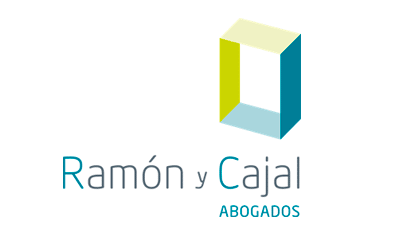



For the realization of this project, four of the best legal firms in our country have signed collaboration agreements.
Currently, the Nebrija Legal Clinic is working on two important projects:
- In collaboration with FARPE (Federation of Associations of Hereditary Retinal Dystrophies of Spain)
- With Project 100, an initiative to help homeless people.
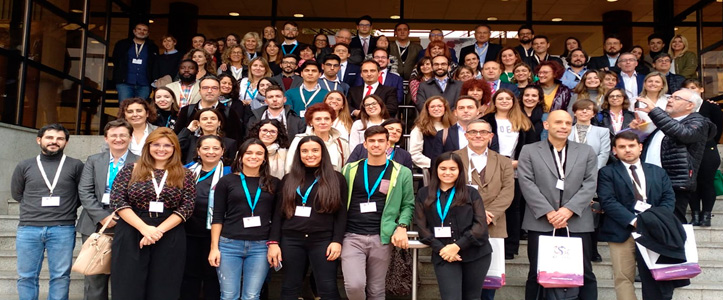
Lecture "The Law in the time of Nebrija"
Lecture by Professor Rogelio Pérez-Bustamante, organized by the Antonio de Nebrija Foundation together with the School of Law and International Relations, as part of the events commemorating the 5th Centenary of Antonio de Nebrija.
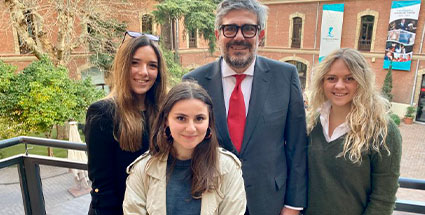
The Nebrija team at the ADEUR Moot Court
The team of the School of Law and International Relations, made up of students Alejandra Moreno Garcia, Maria Ros Saura and Sofia Pascual Tabares, and trained by our professor Jordi Regi, has qualified for the oral phase of the Moot Court organized by the Spanish Association for the Study of European Law (ADEUR).
Read moreVersus Pre-College Debate League
Pre-university students from Madrid and from different provinces participated in this debate league organized by Nebrija University on the Madrid–Princesa Campus.
Opening ceremony of the academic year
Opening Ceremony of the academic year at the Madrid-Princess Campus of the Nebrija University.
Master's Degree in Legal Practice
The School of Law and International Relations presents one of its most consolidated and demanded programs, with the presence of some of the best professionals in the sector.
IMPULSA I. Nebrija Employment Event
Event in which Nebrija talent connects with companies, organized by Nebrija Alumni and the Professional Careers department.
Double Bachelor's Degree in Law + Security
Testimony of Alejandra Moreno, student of the Double Degree in Law and Security.

